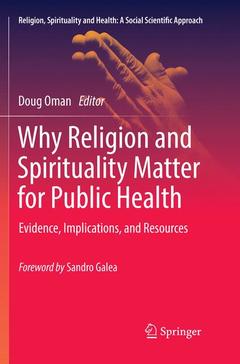Description
Why Religion and Spirituality Matter for Public Health, 1st ed. 2018
Evidence, Implications, and Resources
Religion, Spirituality and Health: A Social Scientific Approach Series, Vol. 2
Coordinator: Oman Doug
Language: English
Subjects for Why Religion and Spirituality Matter for Public Health:
Keywords
Community Health and Spirituality; Environmental Health and Spirituality; Health Care and Spirituality; Health Education and Spirituality; Health Policy and Spirituality; Medicine and Spirituality; Mental Health and Spirituality; Public Health and Spirituality; Public Health and Religion; Religion; Spirituality; and Health
Publication date: 12-2018
Support: Print on demand
Publication date: 05-2018
Support: Print on demand
Description
/li>Contents
/li>Biography
/li>Comment
/li>
Doug Oman received his PhD from the University of California at Berkeley, where he is Associate Adjunct Professor in the School of Public Health. His more than 60 professional publications focus especially on health and longevity implications of spiritual and religious factors, as well as related psychosocial factors such as compassion and altruism. Oman has been principal investigator for two randomized trials of nonsectarian and explicitly spiritual forms of meditation, and was elected President (2016-2017) of the Society for the Psychology of Religion and Spirituality (Division 36 of the American Psychological Association). His 1998 paper, “Religion and Mortality Among the Community-Dwelling Elderly” was awarded the Templeton prize for Exemplary Paper in Religion and the Medical Sciences.
Shows how religion and spirituality are vital and necessary concerns for every major Public Health subfield
Describes evidence-based and theoretically-grounded approaches to research and practice
Shows how public health educators teach about religion/spirituality-health connections
Is a must-own “go-to book” for professionals and students




